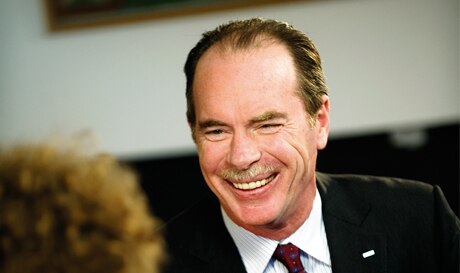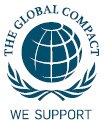
To make sustainability a business reality, we’re grounding it in our reason for doing business – the Electrolux purpose.
2011 was my first year at the helm of Electrolux. At the outset, the leadership team and I announced a shift in tempo and more powerful market engagement around sustainability. That time has come.
Our focus is to make wellbeing and sustainable living easier by making resource-efficient appliances widely available. Through innovation, we want to set the standard for sustainability and lead the way in resource efficiency, water conservation and purity, food freshness and safety.
Sustainability is part of great business leadership and we are convinced future success depends on it.
Sustainability leadership
To take sustainability to the heart of the business, we need to be clear what we mean. Together with members of Group management, throughout 2011 I’ve been doing just that – mapping our vision of what it means to be a sustainability leader in thought and action.
For us, it’s about meeting today’s market needs and turning tomorrow’s challenges into opportunities. It’s about accomplishing our objectives and enhancing the ability of future generations to accomplish theirs. It is growing sustainably with the greatest integrity and the best environmental performance. And it’s improving people’s lives by understanding evolving needs and delivering smarter, more efficient solutions to more people around the world.
It is also about upholding our commitment to the 10 core principles of the United Nations Global Compact and integrating these seamlessly into the way we do business.
Core concern
This year we brought sustainability closer to the core of the business – literally. Sustainability Affairs now reports to the Chief Technology Officer and member of Group Management. Sustainable innovation is among the top four priorities of the Electrolux R&D program, with the spotlight on resource-efficiency, recycling and use of renewable materials.
It’s this strong commitment to innovation that will help us meet future challenges, and new goals we are continuously defining. It’s what underpins iconic products like Ergorapido Plus Green, which is both energy-efficient and made of up to 70% recycled plastics. Albeit a small step, it shows what can be done. Our vision is to reach 100%.
I’m proud to say our approach has been recognized: for the fifth consecutive year Electrolux was named Dow Jones Sustainability Index (DJSI) Sector Leader, featured among the top ten Nordic reporters in 2011 and was included among the World’s Most Ethical Companies 2011.
Growing right
Our aim is for Electrolux to grow – profitably and sustainably. Our sustainability strategy has three core aspects:
- Driving innovation across the full lifecycle and growing the market for more efficient appliances.
- Continuously improving our operations for people and the environment.
- Engaging stakeholders, raising awareness and building partnerships for sustainable solutions.
Strengthening the market
In line with the business strategy, we see strong potential for growth in emerging markets where a rising middle class is placing increased strains on limited resources such as water and energy. Environmental concern is increasing, but has yet to translate into what people buy. To build demand, we need to communicate better with consumers in all markets and raise awareness of the sustainability benefits of efficient products such as those in our green range.
This year we tightened up criteria for the green range – especially for laundry products in North America and food preservation in Europe – meaning it’s now much tougher to be included in the sales figures. This is why green range products accounted for 7% of sales in 2011 compared to 22% in 2010. Even so they represented 15% of gross profits (compared to 35% in 2010), showing that the business case remains: products with outstanding environmental performance generate higher profits.
In the first quarter of 2011, our efforts aimed to strengthen the market further. We launched a green range of vacuum cleaners on every continent. We helped educate US consumers on the importance of energy-efficient products. For this effort, Electrolux Appliances North America was named Energy Star Partner of the Year by the US Department of Energy and the US Environmental Protection Agency.
Integrity and efficiency
We’re proud to report real progress in our performance in three significant areas:
- Achieving and exceeding our energy reduction target in operations a year ahead of schedule
- In Health & Safety, a group-wide reduction of 42% in the accident rate
- The launch of a Group Ethics program.
Doing business with integrity and reducing incidents and carbon intensity in our operations are top priorities for us. The global safety program we started in 2010 has delivered good results: in 2011 Electrolux hit a record-low average incident rate.
Our Ethics at Electrolux program was launched with the first training modules piloted in Latin America in June. With the rollout, a whistle-blowing system was also implemented, something we’ve had in place in North America for some time. In 2012, the program will extend to Europe and, by year-end, Asia Pacific.
Where carbon in our operations is concerned, I’m delighted to say we’ve exceeded our 2012 28% energy reduction target ahead of schedule. Energy use has fallen by 36%, resulting in savings of more than SEK 300m this year compared with 2005. To keep up momentum, we’ve set a 3.5% interim one-year goal while we gauge the investment necessary to deliver further improvement and new reduction targets out to 2015.
Value chain
More than ever, we need to work with others along the value chain to reach shared sustainability goals – and this starts with our suppliers. Between 2004 and 2011, procurement from low-cost countries almost doubled to 60%. Ensuring high global standards is among our top priorities.
Towards this end, we’ve continued to work closely with partners like Business for Social Responsibility to raise the bar on sustainability in the supply chain. In 2010 we piloted an Energy Efficiency Partnership Program with key suppliers in China to help reduce energy consumption. This year, we hosted our supplier summit there and launched an energy-reporting standard among suppliers. It’s a starting block to gain better insight into upstream energy consumption – and what we can do to reduce it.
Positive impact
2011 was the year of the Arab Spring. It’s also the year Electrolux entered the Egyptian market in a big way with the acquisition of Olympic Group and its 10 factories. Our aim is to have a positive impact on local communities and our new employees in the region. To start with, we’ve initiated a program of alignment with company strategy, values and principles for Olympic, focused especially on employment, safety and environmental issues.
As part of our efforts in the wider value chain, 2011 saw improved processes for integrating stakeholder insight and dialog into our business strategies. From 2012, we will also use a brand scorecard to better measure how consumers perceive our company and products.
Outlook for 2012
For Electrolux, 2012 will be about impact-reduction, investment and integration. We are setting goals to lower energy, water and chemicals across all major product categories and enhance efficiency in our operations. As part of our 2015 Group goals, we’re increasing investment in developing advanced technology by 20%, with innovating products for energy- and water-efficiency and design-for-recycling top of mind.
To make sustainability a business reality, we’re grounding it in our reason for doing business – the Electrolux purpose. But to make it a global market reality, we must also create the right market frameworks, backed up with strong signals to producers and consumers – for example through supporting EU 2020 energy saving targets. Electrolux is committed to working with others to make that happen.
Keith McLoughlin
President and CEO

